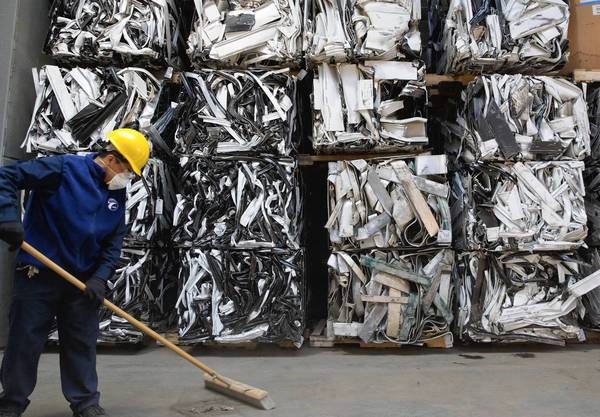
According to the Institute of Scrap Metal Recycling Industries, The United States annually processes more than 250 billion lbs. of scrap material. The industry has produced almost 500,000 jobs in 2013 alone, lending a powerful influence on the country’s economy. The industry generates about $4.0 billion in state and local revenues annually and another $6.3 billion in federal taxes are paid annually by the industry and its employees.
There is also a huge amount of risk that business owners should account for, namely business interruption, regulatory changes, pollution liability, and others. Scrap metal risks can be mitigated with the right alternative risk management plan.
In the following case study, we provide quick facts on a scrap metal recycling company that preempted catastrophic financial and operational risks by forming a captive insurance company. You’ll learn about the scrap metal recycling risks that businesses owners in the industry commonly face and how the broader coverages written through a captive can cover potential losses. Scrap metal recycling risks can have a negative effect on businesses that have gaps in their insurance coverage and forming a captive can be a reliable, supplemental solution for those that qualify.
Background
The large scrap metal recycler buys, processes, and sells non-ferrous and ferrous scrap metals including, but not limited to: copper, brass, aluminum, steel, insulated wire, radiators, nickel, stainless steel, alloys, iron, lead and exotic metals.
The company processes and sells over 150 tons of scrap metal per week, and purchases material from 180-250 clients per day.
The scrap is then sold immediately to domestic and foreign buyers, typically through supply contracts that define the terms and timeframe that the company must abide by to supply the various types of scrap metal products.
The company purchases scrap metal from individual consumers and commercial and/or industrial clients. Individual consumers bring their scrap metal to the company's facility where it is sorted, tested for material, classified and weighed while the customer waits for payment. Commercial customers call the company to pick up scrap metal, which consists primarily of used pipe, sheet metal, wire, metal turnings and obsolete equipment. Its trucks are equipped with scales that can weigh the material at the time of pickup to ensure that immediate payment can be made.
The increase in scrap metal prices in recent years has led to an increased incidence of theft of metal goods that can be sold as scrap. Local police departments were compelled to create metal theft units, increasing efforts to enforce city ordinances, regulating the scrap metal business.
The increased scrutiny has created a risk to the company whereby regulatory compliance could increase operating costs, and slow the supply of legal scrap. A web of complicated laws and additional administrative paperwork has boosted the chance of unintentional non-compliance.

Facilities & Equipment
The company's operational headquarters is located in a 5,000 square foot metallic building. Equipment includes fork lifts, balers, excavator, conveyors, scales, wire strippers, sheers and thermo metal analyzers. The company staffs over 30 employees who include truck drivers, laborers and supervisors.
The Situation: Scrap Metal Recycling Risks
The company, like most scrap metal recyclers, has significant uninsured risk exposures. Key risks that have been identified for coverage through a captive insurer are detailed below.
Loss of Services/ Key Personnel
- As a closely held corporation with limited management depth, the company is highly dependent on the services of key personnel. If the company loses the services of any of the key staff listed above for an extended period of time, it risks the loss of important business opportunities and faces extensive costs finding a suitable replacement.
Legislative and Regulatory Changes
- Some of the company's operations could be adversely affected by regulatory authorities. Metal recycling has attracted much attention over the last couple of years because the high prices paid by recycling companies has encouraged theft of copper, aluminum, and stainless steel from job sites. Continued concerns could lead to much more regulation, which would increase expenses for the company and potentially dissuade customers from selling scrap to the company.
Weather-Related Business Interruption
- Revenue in the scrap metal business is dependent on keeping the trucks busy picking up inventory on a daily basis. The scrap metal recycling risks can be major, especially during and in the aftermath of a major weather-related event. For example, when a hurricane approaches the Houston, TX area, commercial clients close, gasoline shortages occur and business in general is disrupted. Tornado-related risks are more prominent in the Midwest
Pollution Liability
- The company has significant pollution exposure which is excluded from its commercial general liability insurance coverage. If wastes (e.g. oil soaked metal turnings) are mishandled, a pollution incident could occur resulting in significant damage, injuries, cleanup costs, and fines. The location of the company’s warehouse/shop is in a light industrial area of Houston that is rapidly becoming a residential area. The influx of residential dwellings such as apartments and single households create a greater risk for pollution claims. The company has developed and keeps current a state Commission on Environmental Quality Storm Water Pollution Prevention Plan, and works with an environmental services management group to continually work towards compliance.
The company assessed that their risks could not be fully covered with its conventional insurance policy. Its leadership made the decision to form a captive to ensure that potential losses could be covered with a more inclusive, supplemental insurance package. Capstone Associated Services, Ltd. and its affiliated law firm provided the company with true turnkey captive planning—from the initial feasibility study to the setup to the ongoing management of the captive. It was an integral step in maintaining a fully-functional business in the event of a major loss.
Contact us to uncover your potential risk exposures.
Now Trending in Related Industries:
Hazardous Waste Material
The acquisition and recycling of hazardous waste material has been trending in the manufacturing and construction industries. Nuclear or radioactive materials have been typically excluded from coverages in the conventional market but these risk exposures can be covered through a captive insurance company.
In the case of the scrap metal recycling industry, dioxin exposures pose a threat to ill-prepared businesses. The Occupational Safety & Health Administration defines Dioxins as the collective name for a group of chemicals that have been linked to a skin condition called ‘chloracne,’ concerns about male infertility, and cancer. In the recycling industry, high temperatures from the melting of metal, organic material and chlorine are the three factors needed to make doxins—they attach to dust particles and can be ingested through the nose, mouth or skin.
Minimizing risk exposure begins with an evaluation of your organization’s business operations, finances, equipment and staff, as well as understanding the regulatory landscape. Learn how unused premiums can be used as dividends, loans and tax advantages to facilitate growth.
Download a pdf copy of the case study: Scrap Metal Recycling Risks and Exposures, and Captive Insurance




